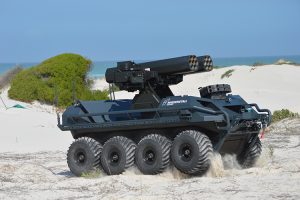European defense contractor Rheinmetall is partnering with Australian researchers to develop advanced sovereign robotics and automated vehicle technologies in order to create a local automated military vehicle capability under the Autonomous Combat Warrior (ACW) program, the company announced in a February 27 statement.
“Rheinmetall’s Australian, German and Canadian development teams will work alongside research teams from Defence Science and Technology (DST) group, the Commonwealth Scientific and Industrial Research Organisation (CSIRO), Queensland University of Technology (QUT) and the Royal Melbourne Institute of Technology (RMIT),” the statement reads.
ACW will focus on the automation of driving capabilities. According to the February 27 statement, Rheinmetall “does not develop, manufacture or market fully autonomous weapon systems [and] rejects fully autonomous weapon systems that deprive humans of the power to decide whether or not to use weapons against other humans.” There is still no agreed upon international definition of what constitutes a fully autonomous system or how it is separate from, for example, automatic weaponry.
The Australian Defense Force (ADF) over the past two years has shown growing interest in semi-autonomous and autonomous land platforms for the military. However, there are manifold concerns about the eventual deployment of such systems.
Notably, the Australian Department of Defense (DoD) through the Defense Cooperative Research Centre for Trusted Autonomous Systems funded a five-year, $5.9 million study in 2019 to help the military develop ethical guidelines for the use of artificial-intelligence (AI) enabled weapons systems and autonomous platforms.
Also, the DoD is working on updating the ADF’s guiding military doctrine document regarding the use of AI-enabled weapons systems. A dedicated chapter on the subject will reportedly appear in the doctrine document by the end of 2020. “The principles will be iterated and adapted, ensuring ethical vigilance on the use of AI and autonomous technologies on an ongoing basis,” a DoD spokesperson told Computerworld in August 2019.
The aim of the ACW program is to develop self-driving, i.e. autonomous, vehicles supported by AI-enabled technologies. Rheinmetall Canada has already developed such a system, the eight-wheel drive Mission Master vehicle, which incorporates an autonomous driving vehicle capability.
According to the February 27 statement, this autonomous driving vehicle capability, or “A-kit,” integrated into the Mission Master “provides the base software architecture for all future stages of the ACW research program and provides the autonomous capabilities including robotic vehicle control (robotic control or semi-autonomous); ‘follow me’ control (semi-autonomous); simultaneous localization and mapping); autonomous waypoint navigation (semi or full autonomous); and GPS allowed/denied navigation (semi or full autonomous).”
The A-kit could be used for a range of different land vehicles and will likely serve as basis for further research. Two Mission Master vehicles are already in Australia. Two Wiesel 2 digital vehicles with drive-by-wire architecture and the A-kit package are expected to arrive in the country later this year for evaluation and testing.
The ACW project reportedly began in February and has no official end date.

































